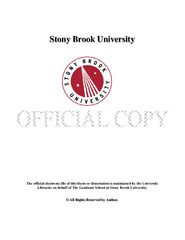| dc.identifier.uri | http://hdl.handle.net/11401/77544 | |
| dc.description.sponsorship | This work is sponsored by the Stony Brook University Graduate School in compliance with the requirements for completion of degree. | en_US |
| dc.format | Monograph | |
| dc.format.medium | Electronic Resource | en_US |
| dc.language.iso | en_US | |
| dc.publisher | The Graduate School, Stony Brook University: Stony Brook, NY. | |
| dc.type | Dissertation | |
| dcterms.abstract | Scholarship concerning alcohol representations in nineteenth-century American literature and culture has predominately focused on " temperance discourse" (meaning temperance ideology, an anti-alcohol moral culture, prohibitory laws and regulations, etc.). Generally, narratives understood to represent this discourse assume that the depicted consumers and producers of alcohol are excluded from the ideally imagined community. In Modern literature, by contrast, alcohol use is understood to represent cultural rebellion by individual characters (as seen in Hemingway's community of ex-patriots, or Fitzgerald's Jazz Age lost generation). The dissertation challenges assumptions of this chronological progression which begins in representations of alcohol's social banishment. Though nineteenth-century American literature, and temperance fiction specifically, depicts the alcohol user as someone who shares neither the assumed values of narrators and readers, nor the sense of community that derives from shared ideological inclusions, on closer analysis such stories do not necessarily treat drinkers' and distributors' anti-social status as a matter of course. Formal analyses of narrative constructs reveal a dramatic tension between criteria of social inclusion and exclusion surrounding the subjects of drink, drinkers and drinking establishments, a tension not always resolved, and sometimes not resolvable. The mere representation of alcohol use does not automatically imply a " temperance discourse" as traditionally understood. This dissertation suggests that literature in the nineteenth century invokes but does not necessarily assume temperance discourse as a means of structuring narrative tension between individual characters and ideologically-defined communities. Whereas some stories stage a righteous condemnation of specific behaviors, others may probe community/national standards and assumptions, leading to entirely different results. Looking at a range of alcohol-themed works including texts by George Cheever, Edgar Allan Poe, Walt Whitman, Frederick Douglass, Stephen Crane, Paul Laurence Dunbar and James Corrothers, this study argues that the representation of alcohol in nineteenth-century American literature does not automatically promote temperance's moral ideologies and the exclusion of drinking characters from narratively defined societies. Instead, alcohol-themed literary texts just as often question (and even challenge) temperance tropes in order to examine the nature of ideological inclusions and exclusions across a range of American communities. | |
| dcterms.available | 2017-09-20T16:52:53Z | |
| dcterms.contributor | Scheckel, Susan | en_US |
| dcterms.contributor | Manning, Peter | en_US |
| dcterms.contributor | Newman, Andrew | en_US |
| dcterms.contributor | Warner, Nicholas. | en_US |
| dcterms.creator | Boluch, Kristin | |
| dcterms.dateAccepted | 2017-09-20T16:52:53Z | |
| dcterms.dateSubmitted | 2017-09-20T16:52:53Z | |
| dcterms.description | Department of English. | en_US |
| dcterms.extent | 264 pg. | en_US |
| dcterms.format | Application/PDF | en_US |
| dcterms.format | Monograph | |
| dcterms.identifier | http://hdl.handle.net/11401/77544 | |
| dcterms.issued | 2014-12-01 | |
| dcterms.language | en_US | |
| dcterms.provenance | Made available in DSpace on 2017-09-20T16:52:53Z (GMT). No. of bitstreams: 1
Boluch_grad.sunysb_0771E_11802.pdf: 1979332 bytes, checksum: e24084075fe3e6f845ff67b1c5f3a0bc (MD5)
Previous issue date: 1 | en |
| dcterms.publisher | The Graduate School, Stony Brook University: Stony Brook, NY. | |
| dcterms.subject | Alcohol, Narrative theory, Nineteenth Century literature, Reader response, Temperance | |
| dcterms.subject | American literature | |
| dcterms.title | Alcohol, Public Perception, and Narrative Design in Nineteenth-Century American Literature | |
| dcterms.type | Dissertation | |

